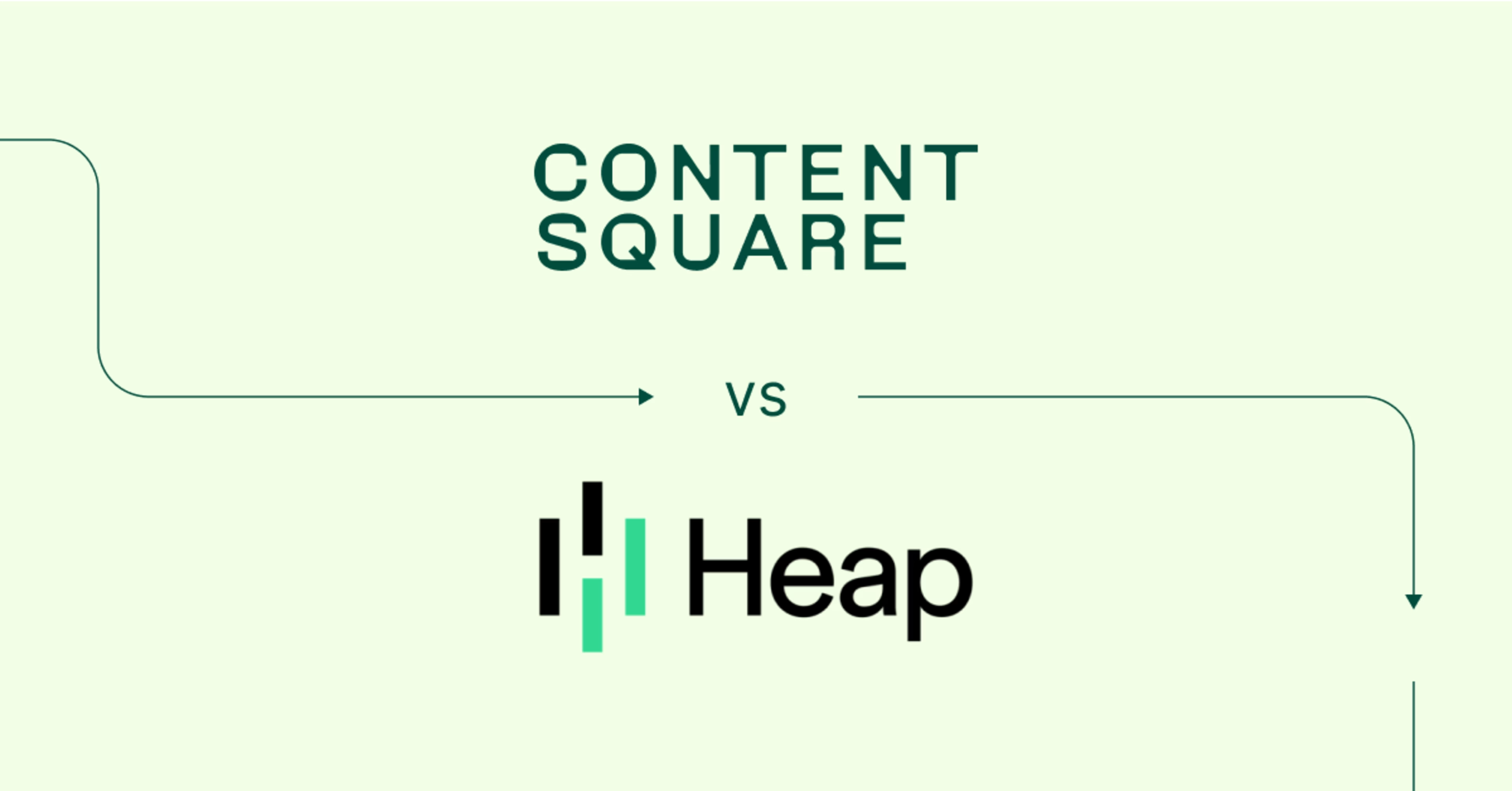Good news: if you’re comparing Contentsquare and Heap you can’t go wrong. 🥳
In fact, Contentsquare acquired Heap in 2023 and integrated its Product Analytics with Contentsquare so users can take advantage of both as a combined, integrated platform.
That means, the real questions to ask are not Heap vs. Contentsquare, but
👉 Why do many teams combine both of them?
👉 How do Heap and Contentsquare complement each other?
👉 Which is the better starting point for you, based on your goals?
Keep reading to see exactly how to use Contentsquare and Heap to solve critical business challenges, compare the different tools and features that come with each product, and decide which option is the best next step for your team based on your needs, or whether you should jump two steps ahead by adding them both.
TL;DR
Heap is one of the top product analytics tools —use it to understand what’s happening on your websites and apps.
Product adoption
User growth and retention
Journey completion and abandonment across web, apps, and offline channels
And answer everyday questions about your users and programs, what’s working well vs. what’s not
A typical situation when data and product teams bring on Heap is when they are frustrated with their existing web, app, or product analytics and unable to answer everyday questions in a scalable way due to constant gaps in their data and a high effort for closing those gaps by deploying additional data collection tags. Heap is often used to replace use cases from traditional analytics such as, for example, GA4.
Contentsquare is the leading all-in-one experience intelligence platform, – use it to understand why users do or don’t complete their journeys, what are underlying root causes, and how you can best improve experiences.
Combine behavior analytics, digital experience monitoring, and voice-of-customer.
Visualize user intent vs. actual experiences
Understand how they see and engage with your content,
Surface points of friction and their root causes, such as slow speeds, technical errors, and UX
So you can improve your content strategy, create friction-free experiences, and learn from customer feedback.
A typical situation when teams ranging from marketing to product, technical, ecommerce, and data bring on Contentsquare is when they are finding themselves needing to answer questions that their existing analytics tools weren’t even designed to answer, e.g. questions about user experience, content engagement between clicks, technical and UX obstacles that prevent conversion, and customer feedback. Contentsquare is typically brought on in addition to traditional analytics such as GA4 and Adobe, or in addition to Product Analytics such as Heap.
Whichever product you choose to start with, you’ll be able to
Save costs and efforts vs. traditional analytics tools by automatically capturing digital behaviors without having to pre-plan tags and burden engineering with constant tagging
Get context about every user action with integrated session replay
Go beyond traditional analytics such as Google Analytics (GA4), Adobe Analytics, Matomo, etc.
Answer questions instantly and retroactively
Combine both to
Prioritize what to create, redesign, or fix based on business impact
Align everyone on the team thanks to data that tells a conclusive story,
Enrich every customer interaction and transform the way that teams work
Heap and Contentsquare are the pioneers for combining Web, Product, and Digital Experience Analytics
In Gartner’s 2022 Market Guide for Web, Product and Digital Experience Analytics, the analyst firm wrote
Data and analytics leaders responsible for digital customer experience use web, product and digital experience analytics to analyze customer and user behavior, digital product performance and usage patterns to improve the digital customer experience.
They described how software vendors are making an effort to provide all three types of insights, because companies ultimately require all three for their success. And the combination of Heap and Contentsquare is a perfect example of that.
Digital analytics markets are colliding and converging as vendors blur the lines between categories such as product analytics and digital experience analytics (DXA) and branch into adjacent markets such as customer journey analytics.
To compare Heap and Contentsquare, for Web, Product, and Experience Analytics, let’s look at it in a structured way.
Start by comparing the data that you will collect and analyze with Heap vs. Contentsquare.
Continue by comparing the type of insights you will get from each
Wrap up with the type of use cases you will solve with Heap vs. Contentsquare
Which is better, Heap or Contentsquare for auto capturing behavior data and lookback analysis?
Unlike most Heap alternatives (like Mixpanel, GA4, or Amplitude), Contentsquare and Heap automatically collect all behavior data so you can answer questions retroactively.
💡 This means you get
Lookback analytics data whenever you need it—for example, if you discover an unexpected spike in sign-ups, you can immediately investigate the source
No need to loop in the engineering team whenever there’s an update—data teams, marketers and product managers get back control over their data without waiting for additional tags to be added
Flexibility to ask new questions of historical data—uncover insights from past campaigns or feature launches
Reduced risk of missing critical data—never worry about forgetting to track a specific event
Lower total cost of ownership—Save on the tremendous amount of effort and cost that is spent on traditional analytics for manual tagging.
Lower fees—Save on fees that some analytics tools (e.g. GA4) charge for capturing additional event data.
This approach saves time, money, reduces technical debt, and ensures you always have the data you need to make informed decisions. And it works right out of the box in both Heap and Contentsquare.
![[Visual] Manual tracking vs. autocapture](http://images.ctfassets.net/gwbpo1m641r7/1upLvWnDjOib3mspiWbMAP/f92482cc550184dfe41747b6a0ad3e6e/unnamed-2024-10-18T104718.598.png?w=3840&q=100&fit=fill&fm=avif)
Autocapture event data in Heap and Contentsquare to simplify your analytics setup
Beyond the common baseline, both Heap and Contentsquare provide additional autocapture functionality to enable their respective use cases. To facilitate scalable web, app, and product reporting, Heap’s auto capture is made practical with additional data governance capabilities
Visual labeling enables data teams to provide friendly names for behavioral events with a point and click UI
Heap makes labeled events front and center for users while keeping the rest of the auto captured events in the backpocket to reduce the noise. Data teams can however always retrieve additional events from this backpocket when analysis requires it. Even more valuable, Heap’s AI features can mine those events within the backpocket and suggest which ones to surface because they impact funnel completions
Meanwhile, to facilitate experience analytics, Contentsquare auto captures additional data
Contentsquare also captures all the behaviors between clicks, e.g. scrolls and hover, hesitation,, mouse moves, clicks on unclickable content, frustration
The context of interactions, e.g. the background of the website page or the specific personalized merchandise display that shoppers interact with on an ecommerce website
The actual experience and underlying technical detail, including slow vs. fast speeds, errors of any kind, and the entire network detail behind them
The bottom line is that both Heap and Contentsquare provide industry leading auto capture capabilities plus specializations for their respective use cases.
For Web Analytics, App Analytics, and Product Analytics, which is better, Heap or Contentsquare?
Both Heap and Contentsquare are powerful analytics tools that leverage the automatically captured event data on your website, ecommerce store, product, or app so you can
Improve conversions, retention, and revenue
Analyze marketing acquisition and know what drives the best ROI
Shift your team to a collaborative, data-driven approach to decision-making
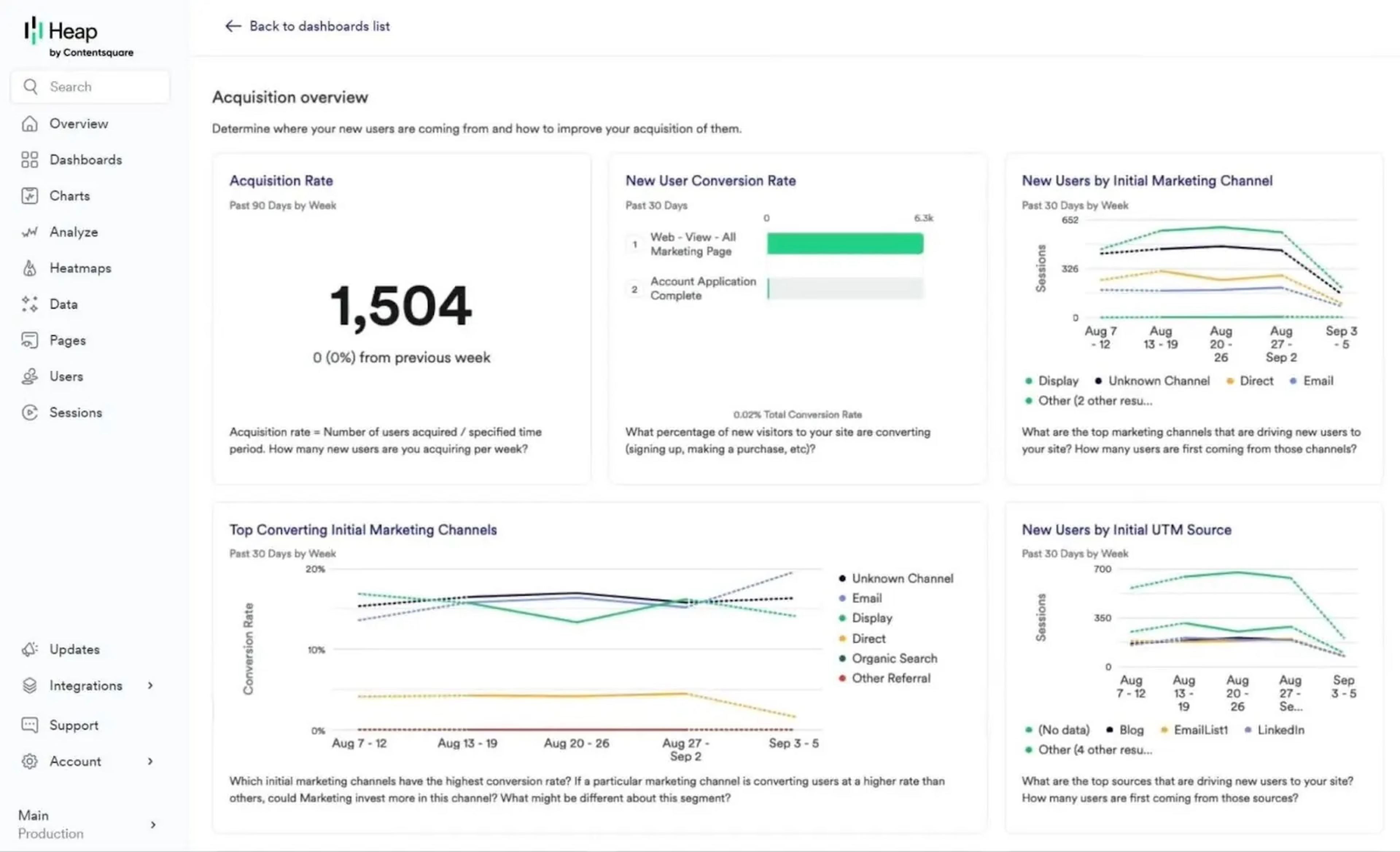
An acquisition overview dashboard in Heap, part of the Contentsquare platform
Both Heap and Contentsquare make this possible with:
Customizable analytics dashboards for different teams and use cases, like an acquisition dashboard for marketers or a feature adoption dashboard for the product team
Lookback analysis to get retroactive data any time with no need to plan what to track in advance
1-click session replays to uncover the ‘why’ behind the numbers
AI-generated insights that provide answers without technical knowledge
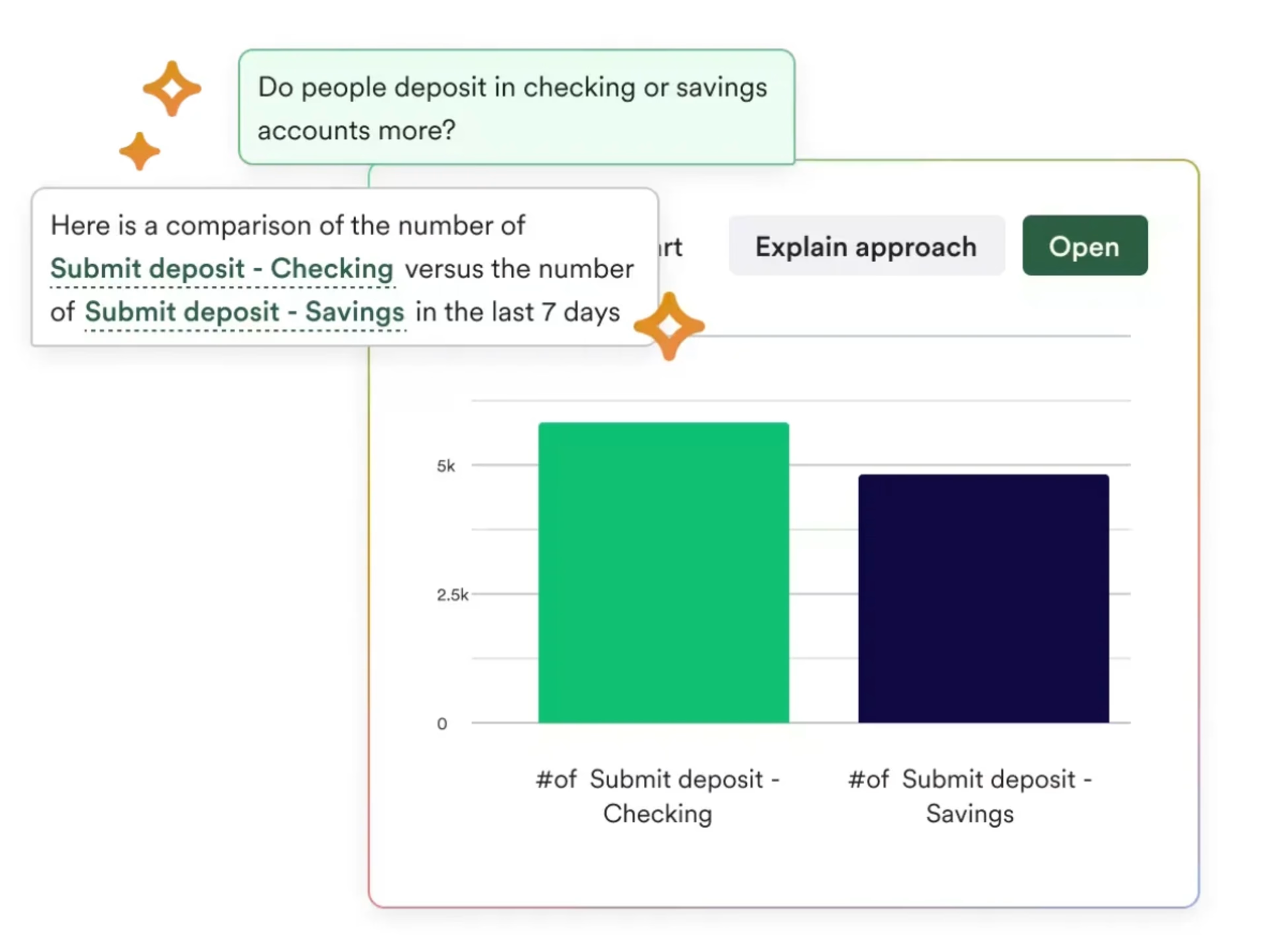
Chat with your analytics data using the Contentsquare Chat with Sense in Heap
That said, Heap powers additional capabilities for Web, App, and Product Analytics. That’s what makes Heap the best starting module for these use cases within the Contentsquare intelligence platform.
Heap is used by data teams for Web and App Analytics baseline KPIs and trends, e.g. funnels, paths, users, sessions, pageviews, conversions, etc.
Heap provides marketing acquisition analytics such as traffic and conversions by campaign
Heap shows how journeys continue across devices, e.g. how users move from your website to your apps and whether they end up completing their journeys offline
Heap provides lifetime analytics metrics that show how users continue and complete their journeys across multiple sessions
Heap Connect is the industry’s most popular data feed product that sends its auto captured, AI-ready data directly into data stores such as Snowflake, Big Query, Redshift etc. so that data and marketing teams can merge it with their other data and mine it for additional insights
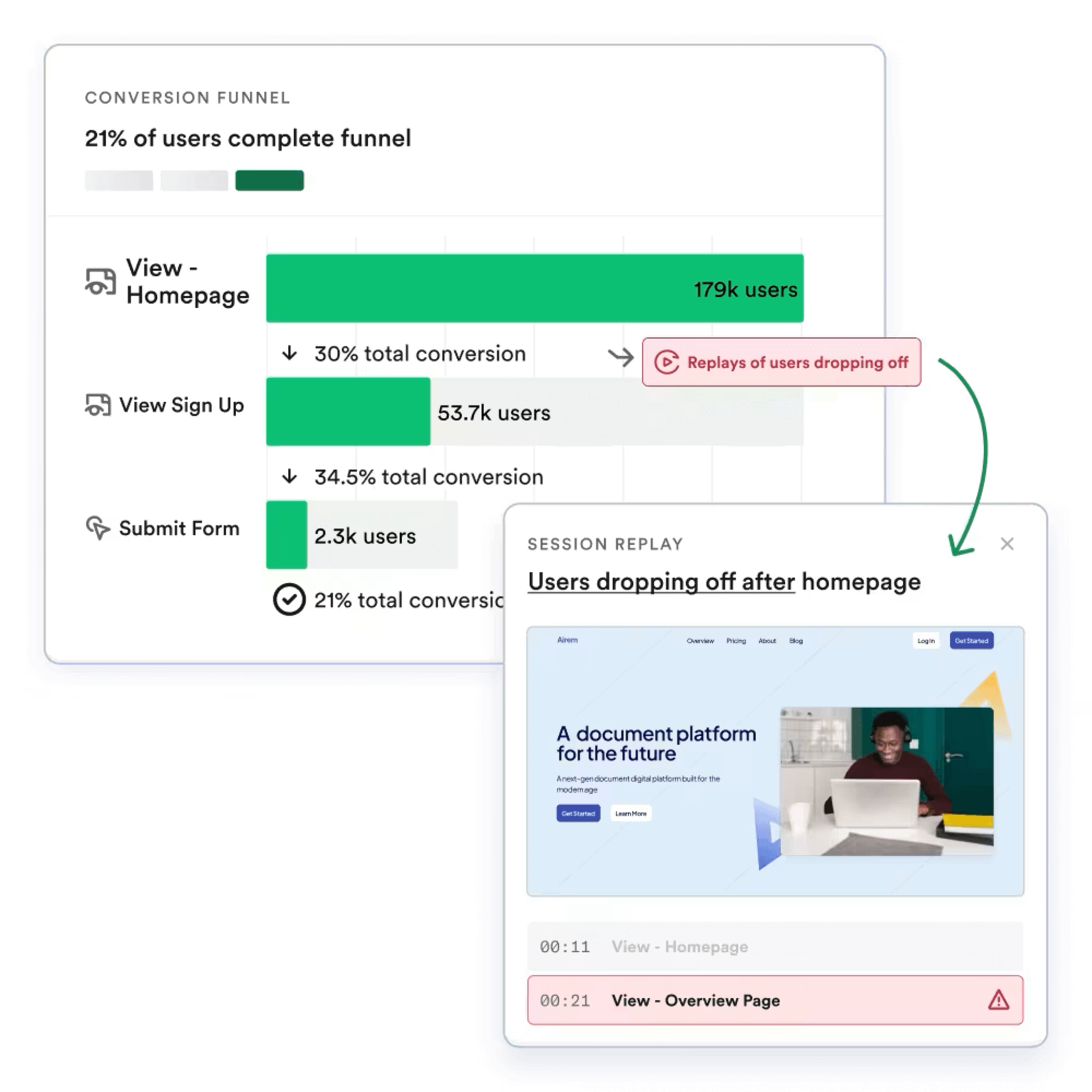
Click to view relevant session replays to troubleshoot funnel dropoff in heap
When Heap and Contentsquare are combined, most of these additional insights become part of the Contentsquare platform as well so that users benefit from both. For example, Heap’s lifetime analytics metrics are now integrated into Contentsquare’s Zone-based Heatmaps.
For Experience Analytics, which is better, Heap or Contentsquare?
While Heap excels in Product Analytics, Contentsquare complements its scope by integrating 3 crucial analytics categories into a single, unified solution:
Digital Experience Analytics (DXA)—see which behaviors drive engagement and revenue
Digital Experience Monitoring (DEM)—uncover obstacles and prioritize fixes
Voice of Customer (VoC)—collect feedback, analyze it with AI, and integrate insights with qualitative data points
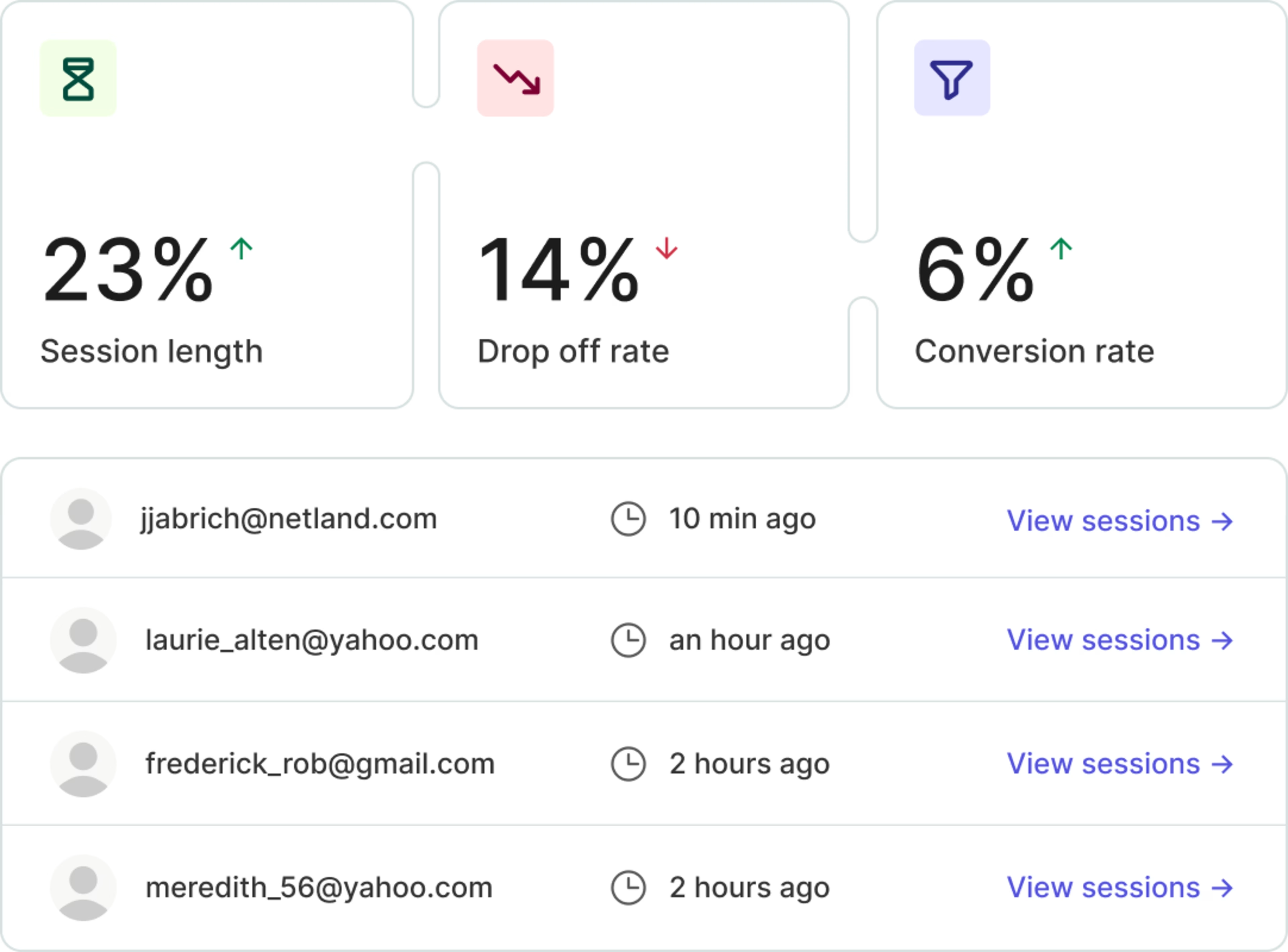
Use Contentsquare to get a complete understanding of your customer experience across sessions
But it’s not just about having access to different tools that makes Contentsquare powerful—it’s by combining them together to enhance insights and save time.
Here are a couple of ways that might work in your company:
Live browsing heatmaps (CS Live) + Impact Quantification—identify which CTAs bring the most clicks, then quantify how much revenue they’re driving
Error Monitoring + Session Replays—automatically detect errors, then view relevant session replays to see exactly what users experienced before, during, and after the error occurred
Frustration Scoring + Session Replays – save time by ranking which sessions to replay that are most likely to be insightul
Funnel Analysis + Journey Analysis—identify drop-offs in your funnel, then see alternative paths users are taking to optimize goal conversion
Save time focusing in high-impact optimizations with Contentsquare’s AI-powered insights such as Frustration Score
Which is better for your business use cases, Heap or Contentsquare?
That’s all great, but what does it mean for your everyday business use cases? See below how Heap and Contentsquare complement each other for solving typical use cases.
Capability | Examples how Heap helps | Examples how Contentsquare helps |
|---|---|---|
Improve marketing acquisition | Report and compare how traffic from different sources flows and converts, across devices and sessions | Reveal why acquired traffic bounces on landing pages and how to reduce bounce rates |
Improve product adoption and growth | Manage products and feature roadmaps with metrics for adoption, repeat usage, impact, etc. | Understand why users may miss features or hesitate on using them and how you can improve their adoption |
Improve user retention | Manage your programs for user retention based on data, e.g. user registrations and wish lists. Understand which interactions help vs. hurt loyalty | Understand what it is that gets in the way of users trying to complete journeys so that they abandon and potentially never come back |
Improve content strategy and engagement | Surface click-based content interactions that correlate with positive vs. negative outcomes | Enable Marketing teams to browse their website and overlay engagement and conversion metrics with a click to understand what content to keep, improve, or promote better |
Create friction-free experiences | Correlate abandonment and churn with interaction events | Rank sessions by frustrations, reveal underlying issues such as UX, speed, errors, including the entire network detail that engineers need to understand root causes of problems |
Create more results from your A/B testing program | Inform A/B testing for features and their adoption by automatically ranking the features that drive positive outcomes and repeat usage vs. the opposite | Inform what A/B tests to run for content, layout, and UX improvements, e.g. by surfacing content elements that are great at driving conversions but need better promotion vs. surfacing UX issues that need a better design. |
Gather and make sense of customer feedback | Identify the journeys that lead to abandonment where users give up and seek help from the contact center | Collect feedback and surveys directly and make sense of it by replaying individual sessions leading up to complaints and surfacing the journeys that lead to the biggest issues |
Answer everyday questions | Answer any question, faster, retroactively, based on data about engagement experiences, and technical issues | Answer any question, faster, retroactively, based on data about engagement experiences, and technical issues |
Create a culture of data-driven decisions for all | Remove obstacles for data driven decisions by auto capturing a more complete data set that enables better answers, faster. Enable product teams to manage roadmaps based on data, instead of opinion | Remove obstacles for data driven decisions by providing immersive, visual insights that everyone on the team can understand, for example via live browsing heatmaps. Align both business and technical teams around customer wants and needs e.g. by prioritizing which experience issues to fix based on the impact on conversion and revenue |
Intuitive, visual insights even your CEO will understand
Not everyone loves line graphs and bar charts. Sometimes, you need a way to make data grab attention—especially when you’re trying to win over a stubborn stakeholder (we all have one).
That’s where Contentsquare’s visual analytics tools improve on what Heap offers, turning complex data into eye-catching, instantly understandable insights. You get
Heatmaps—see where users are clicking, scrolling, and hovering and overlay revenue and conversion impact of behavior at a glance.
CS Live—think of it like X-ray vision for your website. This Chrome extension overlays key metrics directly on your live pages, letting you see performance data in real-time as you browse.
Journeys—visualize customer journeys in a way that is more helpful for discovery. It displays a top-down view of all user flow through the entire website or app at one glance. It even lets you compare journeys side by side to understand what drives conversions and where you’re losing business
![[Visual] Heatmaps & Engagements](http://images.ctfassets.net/gwbpo1m641r7/7q4KlAZp8BvTjZLKa3yf5T/ad3512811b1c7a0b1c9d6846968c14d1/Heatmaps___Engagements.png?w=2048&q=100&fit=fill&fm=avif)
Visualize click, revenue, and conversion metrics on your live website with Contentsquare
Each visual tool is also deeply integrated with Contentsquare’s analytics engine so when you spot something interesting, you’re just a click away from diving deeper into the data, running advanced analyses, or sharing insights with your team.
Instead of abstract data and numbers in columns, [Contentsquare shows us] what people are doing on our website. We can see their experience. It’s visual.
Create happy users with the help of feedback
What’s more, with Contentsquare, you’ll also get more ways to color in your quantitative analytics data with
Feedback Collection—capture in-the-moment voice-of-customer insights as people use your product or site, without interrupting the user journey
AI-powered Surveys—collect targeted feedback and sentiment and analyze results with AI

Improve customer experience by collect VoC data with Contentsquare
Is Contentsquare or Heap the better starting point for your team?
While Heap and Contentsquare share core analytics features such as session replay and error analysis, they cater to different use cases. Here’s how to choose your best starting point between them:
🔍 Broadly speaking, Heap will be the better starting point if …
Your existing web, app, or product analytics is making it too hard to answer everyday questions due to constant gaps in the data and the prohibitive effort of constant tagging
You are looking for alternatives to your traditional analytics such as GA4
You want to better understand journeys and conversion funnels across devices and user lifetime
You want to track product and feature adoption, what drives loyalty and what causes churn
And use these insights to answer everyday questions and prioritize what features of your sites and apps to keep, which to drop, and which to enhance, based on business impact.
✅ Choose Contentsquare as your starting point if …
You already know where customers abandon your journeys but you are not sure why and how to improve results
You want to step into the shoes of your users to see how they experience your sites and apps with the help of immersive visual analytics tools
You want to surface the root causes behind struggle with robust error tracking, speed analysis, and UX frustration scoring
And use these insights to prioritize how to innovate better experiences, how to improve them, and how to fix them based on business impact.
🌟 Get started with both Heap and Contentsquare together if …
You can’t afford to lose time and need to transform your digital team’s effectiveness quickly, e.g. for getting ready to make the most out of an upcoming holiday season or a re-platforming project
Your strategy is to use data for growing your business despite a challenging market or challenging competition with help of a comprehensive experience intelligence platform that enables all teams to make data-driven decisions, e.g. product, marketing, UX, and technical teams
🎯 Regardless of whether you start with Heap or Contentsquare, you will have access to
Advanced AI-powered insights to quickly identify and prioritize high-impact optimizations
Enterprise-grade features including advanced security, privacy controls, and dedicated support
Session replay to illuminate user behavior and technical issues
Ultimately, you need to see inside each product yourself to get a feel which will meet you where you are at right now.
Get it done today by requesting a Heap demo and taking the 6-minute Contentsquare product tour to see how both platforms turn your data into growth-driving insights.
FAQs about Contentsquare vs Heap
Heap Analytics is a freemium digital insights platform that autocaptures web and app events to optimize digital journeys, improve conversions, retention, and customer delight. Heap was founded in 2013 in Silicon Valley by Matin Movassate and Ravi Parikh. Today, Heap is used on over 10,000 websites and has been part of the Contentsquare platform since 2023.
![[Visual] Contentsquare's Content Team](http://images.ctfassets.net/gwbpo1m641r7/3IVEUbRzFIoC9mf5EJ2qHY/f25ccd2131dfd63f5c63b5b92cc4ba20/Copy_of_Copy_of_BLOG-icp-8117438.jpeg?w=1920&q=100&fit=fill&fm=avif)
We’re an international team of content experts and writers with a passion for all things customer experience (CX). From best practices to the hottest trends in digital, we’ve got it covered. Explore our guides to learn everything you need to know to create experiences that your customers will love. Happy reading!
